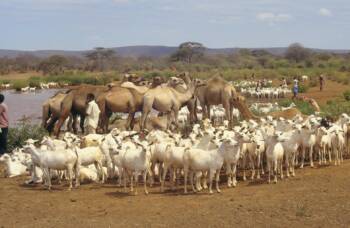With camelids into a sustainable future
 For the International Year of Camelids 2024, Misereor, DITSL (German Institute for Tropical & Subtropical Agriculture) and LPP (League for Pastoral Peoples) in Germany have brought out a dossier on pastoral camelid husbandry around the world: “With camelids into a sustainable future: learning from pastoralist communities” (2024, 20pp), published by welt-sichten, Frankfurt.
For the International Year of Camelids 2024, Misereor, DITSL (German Institute for Tropical & Subtropical Agriculture) and LPP (League for Pastoral Peoples) in Germany have brought out a dossier on pastoral camelid husbandry around the world: “With camelids into a sustainable future: learning from pastoralist communities” (2024, 20pp), published by welt-sichten, Frankfurt.
It describes the various challenges faced by camelid pastoralists in Africa, Asia and Latin America, such as prolonged droughts, increased competition for land and water, low product prices, lack of labour and weakened social institutions. Yet these pastoralists continue to contribute to local livelihoods and national economies by supplying wool/hair, live animals and hides for national and international markets, and – in Eastern Africa – they have taken initiative to build value chains in response to growing urban demand for camel milk.
The contributions to this dossier offer a differentiated picture of camelid pastoralists’ realities. An introduction to the importance of pastoralism worldwide is followed by an analysis of how camelid husbandry has evolved over recent decades. Specific articles describe pastoral camelid husbandry in Eastern Africa (“Camels as far as the eye can see: history and expansion of camel keeping in Eastern Africa” by Piers Simpkin & Jacob Wanyama) as well as Mongolia and the Andes. The dossier also looks at the role of research on camelid pastoralism and discusses policies that are needed for a sustainable future for camelids and the communities that rear them.
The dossier is also available in German.
Posted on 27 March 2024 in Pastoral Research & Innovation, Pastoralism & Climate Change, Pastoralism & Culture, Pastoralism & Marketing, Pastoralism & Natural Resources, Pastoralism, Mobility & Land Tenure, Pastoralism, Policy & Power, Pastoralist Livelihoods & Nutrition, Value of Pastoralism
